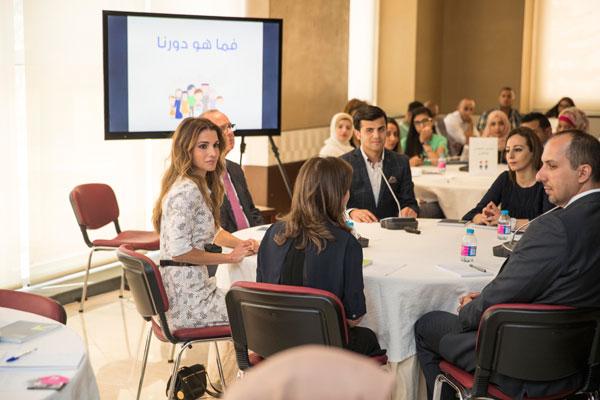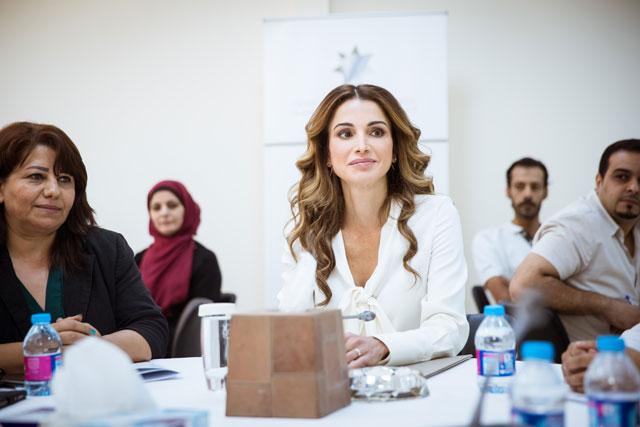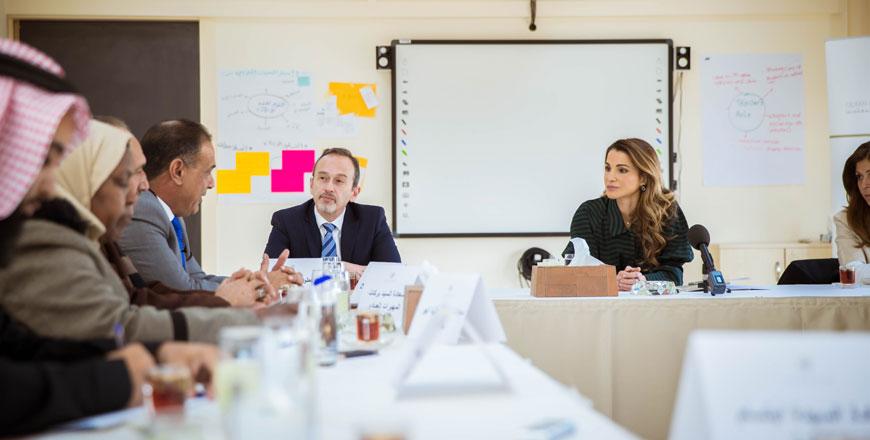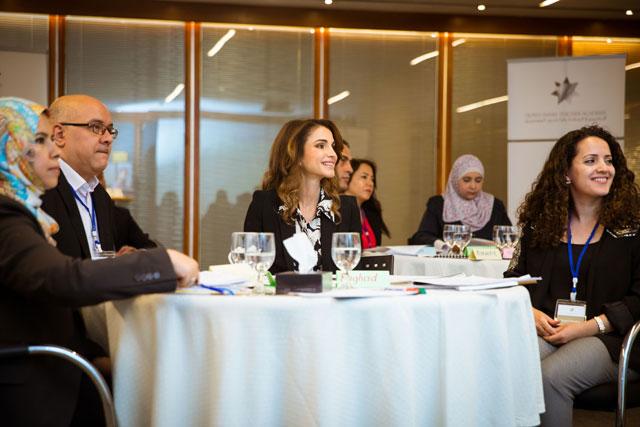You are here
Queen says education reform should be national priority
By JT - Aug 17,2016 - Last updated at Aug 17,2016

Her Majesty Queen Rania attends a discussion session with youths and members of the National Committee for Human Resources Development in Amman, on Wednesday (Photo courtesy of Royal Court)
AMMAN — Her Majesty Queen Rania on Wednesday called for turning education reform into a national priority and a long-standing popular demand by the Jordanian people, explaining that it is the foundation on which security, national identity, and a strong economy lie.
The Queen made these remarks during a discussion with young people from Jordan Volunteers (JV) and members of the National Committee for Human Resources Development at the King Hussein Business Park in Amman, about the impact of education on the future job market, according to a statement from Her Majesty’s office.
Queen Rania also stressed the importance of honesty and openness in acknowledging the challenges the education sector faces, in order to enhance active and collective participation by all to revamp it.
She added that the time is ripe for the participation of Jordanians as key stakeholders in education reform, with the new academic year and a parliamentary election around the corner.
According to Her Majesty, huge strides need to be made in vocational training offered by schools in order to meet the needs of the job market.
She referred to the Royal Academy of Culinary Arts, which was initially met with disapproval, but quickly attracted youths for its ability to provide excellent job opportunities to its graduates.
She also stressed that progress and development mean being open to outside experiences and applying successful education reform plans used abroad in Jordan, in a way that preserves local traditions and values.
The Queen listened to youth participants describe their qualms about the current reality of education in the country and their recommendations for improvement.
They discussed the dire need for revamping school curricula to meet present-day needs and standards.
They also stressed the importance of reassessing the teacher-hiring process, explaining that teachers are currently being hired based on when they submitted their applications to the Civil Service Bureau, rather than on their qualifications.
Members of the human resources panel explained that national and international studies have proven that good teachers must receive pre-service training and regular on-the-job training, according to the statement.
The Queen said a specialised academy has been established to train future teachers before they enter the classroom.
The discussion follows recommendations for education reform issued by the HR development committee, which was formed in April 2015, after His Majesty King Abdullah tasked the then prime minister Abdullah Ensour with developing an integrated, comprehensive, strategic and well-defined system for human resources development.
The committee collaborated with a number of experts and specialists to produce an inclusive report on education in Jordan, on which its recommendations were based.
During the discussion, participants talked about the importance of early childhood development in shaping children’s intellectual and emotional development, which is severely lagging behind in Jordan according to the HR development committee’s research.
Committee experts said that very few children enrol in kindergarten before starting elementary school, and that kindergarten teachers are not required to have any training in this field before being hired.
Youth participants also expressed their frustration with the General Secondary Education Certificate Examination (Tawjihi), which is the determining factor in whether they attend university and what major they study, questioning its ability to properly assess students’ aptitude and ambitions.
On vocational training programmes, the youths said the ones offered represent the weakest link in the education process because they are outdated and do not meet the job market’s requirements.
Currently, these programmes only attract the lowest-achieving students, and are unattractive for high-scoring and female students.
As for higher education, the discussion centred on the fact that criteria for university enrolment are neither compatible with the students’ interests and aspirations, nor with the job market’s needs. This in turn has led to a drop in the quality of higher education outcomes, and an inability to achieve economic development plans.
Experts attributed the decline in university education outcomes to inconsistent legislation and the introduction of parallel enrolment programmes, which has led to a surplus in graduates from certain majors, the statement said.
The parallel programme is allocated for students whose Tawjihi scores do not qualify them to study specific subjects at public universities through the regular programme.
To meet international standards, the youths also called for introducing a foundation year for medical and engineering students, and for abolishing the parallel programme to limit the number of unqualified students, according to the statement.
At the end of the session, the director of Jordan Volunteers, Mutassem Masalmeh, said it was important to abide by the HR development committee’s recommendations and adopt them at an institutional level, in order to regulate the reform process.
He also added that youths have an essential role in capitalising on the crucial election campaigning period to bring education reform to the forefront of discussions with candidates and voters, and to remind them of the importance of prioritising education in election platforms as a driver for change.
Related Articles
AMMAN — Her Majesty Queen Rania said on Sunday there is no time to waste when it comes to reforming Jordan’s educational system, adding that
AMMAN — Her Majesty Queen Rania met with the Lower House Education Committee on Monday to discuss critical issues related to educational ref
AMMAN — Her Majesty Queen Rania on Sunday was briefed on preparations currently under way to launch the Queen Rania Teachers Academy’s (QRTA



















